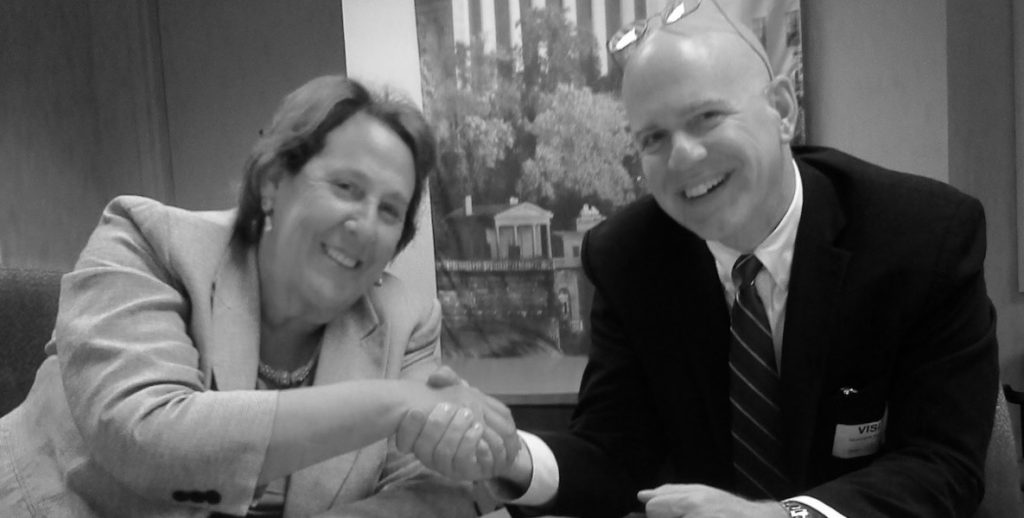I first encountered Mayor Nutter at the 2008 Women’s Transportation Seminar Annual Dinner. He was being honored as “Man of the Year.” Having recently joined his Deputy Mayor for Transportation and Utilities team, I approached him in the receiving line.
“Mayor Nutter, it’s nice to meet you. I’m Andrew Stober and I work for Rina Cutler,” I said, extending my hand.
Nutter, with his signature deadpan delivery, clasped my hand firmly, gazed into my eyes, and replied, “Andrew, we all work for Rina Cutler.”
Rina expected excellence and integrity from everyone, and instilled a sense of collective responsibility to those in her orbit.
Rina, who died last week at age 70, made lots of people feel that way. She expected excellence and integrity from everyone, and instilled a sense of collective responsibility to those in her orbit.
Mayor Rendell brought Rina to Philadelphia from Boston, where she had served as Transportation Commissioner, to modernize the Philadelphia Parking Authority. She went on to lead important innovations at the Pennsylvania Department of Transportation. In Philadelphia, her leadership resulted in generational improvements, including the South Street Bridge, Indego bike-sharing program, Schuylkill River Trail, cleaner rivers and a more collaborative relationship between SEPTA and the city.
Gary Miles’ beautiful obituary in The Inquirer perfectly described her: “A social worker at heart, public servant by opportunity, and teacher by nature, Ms. Cutler served countless people in Philadelphia, Boston, and San Francisco as an expert in transportation, infrastructure, people, and the intricacies of government.”
Rina was my boss, mentor and friend for 15 years. To honor her nature as a teacher and her dedication to public service, here are three of the most important public leadership lessons she imparted.
Lesson 1: Stay in touch with Mrs. O’Malley
Rina, a Bostonian through and through, never forgot Mrs. O’Malley, the archetypal South Boston resident who cares deeply for her city but focuses primarily on her family, neighbors and local news. Public servants must accept that most residents aren’t deeply invested in our daily work. They have more pressing personal concerns.
However, even though Mrs. O’Malley may not be thinking about us, it’s our responsibility to think about her. What are her needs? What does she want for her loved ones and community? Most importantly, never implement policies or programs that you can’t explain to Mrs. O’Malley.
Lesson 2: Practice partnership and “problemship”
Rina would occasionally enter meetings with large institutional players, businesses or advocacy groups with a warm smile and proclaim, “I can be a partner or I can be a problem. I am very good at both. The good news for you is that you get to choose which I’ll be.” This, of course, was a power move. Rina deployed these declarations judicially, always punching up, never down. At the core of the message is a critical lesson about getting things done in complex systems that she applied all the time: You must be able to partner effectively and you have to be willing and able to cause problems (the government executive’s version of John Lewis’ good trouble).
Building partnerships requires clarity about your own objectives, understanding your partner’s interests, crafting creative agreements and establishing mutual accountability. Effective “problemship” involves using laws, public processes, and your public platform to highlight how policies, programs, or projects conflict with public values and interests. Rina mastered both skills, demonstrating remarkable judgment in choosing when to partner and when to cause necessary friction.
Lesson 3: Nurture and elevate excellence wherever you see it.
During Mayor Nutter’s first term, our team faced the daunting task of curbing litter while increasing public engagement in our efforts (see lessons 1 and 2). One day, a meeting appeared on my calendar: “Larry (Platt) and Sandy (Shea).” (Editor and Editorial Page Editor at the time of The Daily News.) Rina explained, “I’m going to teach you how to do an editorial board.”
I’ll never forget the way she captivated the Daily News’ editorial board with a perfect blend of swagger, humility, facts, stories and humor. Days later, an enthusiastic column appeared.
The comments sections of LinkedIn posts honoring Rina are filled with tributes to her mentorship. Retired department commissioners, some of the city’s most respected leaders, credit Rina with preparing them for their roles, guiding them through their early years in executive positions, and always remaining a valuable resource. Rina wasn’t threatened by talent; she was drawn to it. She ensured her team was learning and growing, preparing them for future leadership roles, even if they didn’t yet realize it.
I was incredibly fortunate to call Rina my boss, mentor, and friend. Philadelphia was equally fortunate to have her as a leader. Her legacy will continue to benefit the city for decades to come.
Andrew Stober, head of global public partnerships at Waze, was Rina Cutler’s chief of staff when she served as Mayor Michael Nutter’s Deputy Mayor for Transportation and Utilities.
The Citizen welcomes guest commentary from community members who represent that it is their own work and their own opinion based on true facts that they know firsthand.
MORE PHILADELPHIA CITY WORKERS WE ADMIRE

